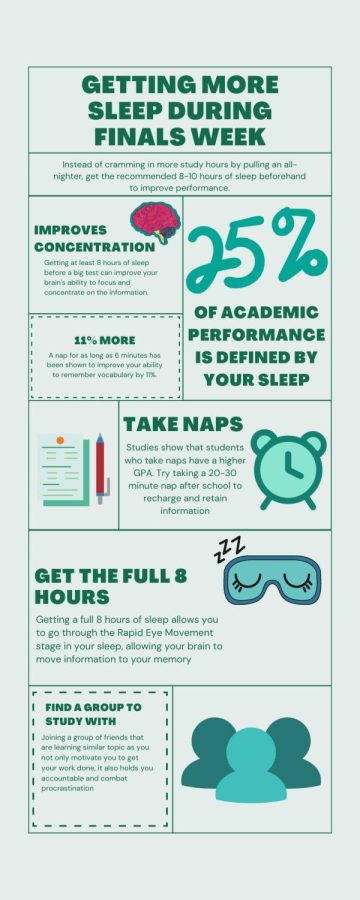Sleeping helps you study
Resting during finals weeks helps improve scores
The impact of getting enough sleep during finals and ways to ensure you perform well.
December 14, 2022
The CDC recommends that students get anywhere from eight-10 hours of sleep each night. This helps improve memory, concentration and overall ensures that you perform well academically.
As finals are approaching, it is crucial that students stay on top of their sleep schedule and not try to cram in extra study hours by pulling all-nighters. Houston Methodist says that pulling an all-nighter can do exactly the opposite of what you are trying to achieve when doing so. The next day, concentrating becomes more difficult, problem-solving is impaired and risky decisions are more commonly made. Performance the day after pulling an all-nighter isn’t the only negative effect, but the disruption in your sleep schedule makes it hard for you to recover from one, causing events like these to become more common.
According to the Sleep Foundation, 25% of your academic performance is made up by your sleep. When you reduce the amount of sleep you get each night, you are cutting the Rapid Eye Movement (REM) stage short. During this stage, you don’t just dream, your brain takes the time to process information and commit it to your memory. Therefore, the more time you spend asleep at night greatly benefits your brain’s ability to retain information.
While schedules are busy during this time, it is important to find ways to get more sleep throughout the day. The Sleep Foundation states that students who take more naps throughout the day typically have higher GPAs. Furthermore, a nap as long as 6 minutes can improve your ability to remember things like vocabulary by 11%. Try scheduling naps after lessons and for no longer than 30 minutes, as a nap for too long can keep you up at night.
As far as studying, use any extra time in class or during the school day to get things done. If there is no time, finding or making a group to study with has been shown to benefit students. According to Florida National University, studying with a group helps combat one of the most common things when it comes to studying, procrastinating. Working with a group of friends helps motivate students to learn, and each person is held accountable for helping the others around them.
Overall, one way to prevent the stress of finals week is to simply just sleep. Not only will it make you feel better the next day, but it greatly benefits your ability to retain and recall information from classes prior. Instead of cramming all of your studying in the night before, study beforehand with a group or after a short nap.







